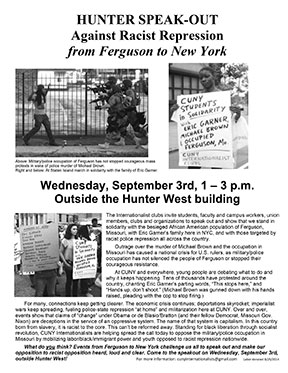September 2014
CUNY Students, Faculty Speak Out
Against Racist Repression
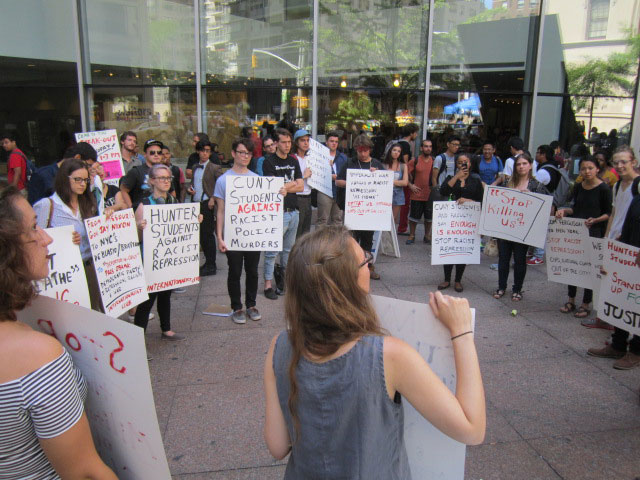
Students and faculty at Hunter College, City University of New York, at September 3 speak-out organized by CUNY Internationalist Clubs against racist repression, from Ferguson, Missouri to New York City. (Internationalist photo)
This report from a CUNY Internationalist activist is accompanied
by the leaflet for the September 3 “speak-out” at the
City University’s Hunter College campus, and edited excerpts
from speeches made at the protest. The flier calling for the
protest can be found here.
The heinous police murder of Eric Garner in Staten Island, followed by that of Michael Brown and the military/police occupation of Ferguson, Missouri, brought a wave of outrage across the United States and around the world. Thousands of anti-racist young and working people of all ethnicities took to the streets in solidarity with the besieged African American population of Ferguson, and with the families of Brown, Garner and others targeted by deadly police brutality. Backlash bigots eventually got up the nerve to start collections for the cop who gunned down Michael Brown, while in New York their counterparts howled in lynch-mob fury against the teachers’ union for daring to join a march in support of the Garner family. Faced with the unending horror of racist police terror, the question was posed to all, in the words of the old miners’ song: “Which side are you on?”
For its part, the Obama administration did its job for the ruling class, which decided some time ago that it would be useful to have some “black faces in high places” help administer the system of racist oppression called capitalism in the USA. Having funneled high-tech weapons to police across the country, while waging ever-expanding wars abroad, they tried to head off protests with speeches about non-violence (for the oppressed only). Meanwhile, as Missouri Governor Jay Nixon (also a Democrat) mobilized the National Guard to try to terrorize the black people of Ferguson. Attorney General Eric Holder, seconded by cool-things-out operatives Jesse Jackson and Al Sharpton, worked to drown mass indignation in illusions about police “reform.” These are the same illusions pumped out time and time again when revulsion against systemic police violence has reached crisis proportions.
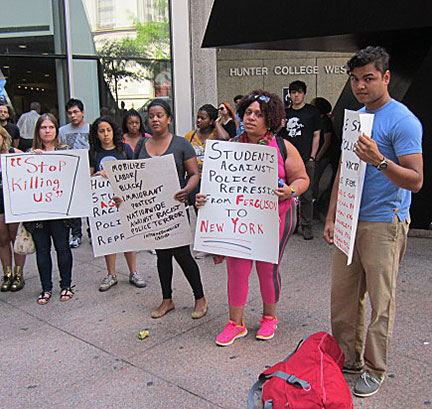
At the largest urban public university in the U.S., the City University of New York, police harassment is a basic fact of life for innumerable students, together with economic crisis and spiraling inequality that keep making life harder for them and their families. As students and faculty returned for the fall semester, the CUNY Internationalist Clubs got a strong response to our call for a “Speak-Out Against Racist Repression” on September 3, at CUNY’s Hunter College in midtown Manhattan. With Internationalist activists leafleting intensively from the beginning of the school year, students were drawn into animated discussion on the roots of racist police terror and what needs to be done to end it. Club members noted a lot of responsiveness to our point that police brutality is endemic because “U.S. capitalism is racist to the core” and has been since its origins in chattel slavery. They also saw a marked upswing in interest from black women students in particular, as well as many first-year students.
During last school year’s protests against CUNY’s hiring of former Iraq/Afghanistan war commander and CIA head David “Death Squad” Petraeus (see Revolution No. 10, October 2013, as well as additional articles on the web page of Revolution, the publication of the CUNY Internationalist Clubs), the Board of Trustees ramped up its efforts to eliminate student protest, pushing for an “expressive conduct” policy that would gut the most basic rights. Reflecting this, hours before the September 3 Speak-Out on police repression, a sign-making and literature table inside the Hunter campus was shut down by campus police (on the pretext that a “permit” was needed to use otherwise empty tables). That this was no coincidence was highlighted as they ostentatiously turned a large sign announcing the protest so it was facing the wall and could not be read.
Held outside the Hunter West building, the September 3 speak-out drew upwards of 75 participants at its peak, with a core of about 45 staying the full two hours. Immigrant restaurant workers came down from the Bronx as part of a delegation from the Laundry Workers Center organizing group. A group of African American workers from the New York Blood Center, located near the campus, were drawn to the protest and stayed for a while listening intently to the speeches, as did some Hunter maintenance workers. Apart from the Internationalist Clubs and Class Struggle Education Workers , the CUNY “left” was completely absent, with the honorable exception of one Progressive Labor Party activist at Hunter.
It was noteworthy that a number of people who had never participated in any kind of protest before stepped forward to voice their own responses, ideas and experiences regarding racist repression. Building on this and deepening the political discussions from the September 3 event will be key to our work. We print below excerpts from some of the remarks by participants:
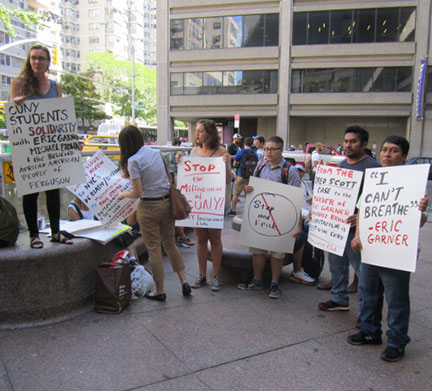
Portia, CUNY Internationalist Clubs and Class Struggle Education Workers, opened the event: Join with us today in this Speak-Out Against Racist Repression, from the murder of Michael Brown and the racist occupation that was carried out in Ferguson, Missouri to the case of Eric Garner and all those killed by the NYPD. It’s not a case of “some bad apples” in the police – this is a system of racist police brutality built to enforce capitalist power. This is what we’re protesting against. We’d like to hear what people have to say, to speak out and take a stand. Come grab a sign and stand in solidarity.
Ferguson, Missouri was put under a militarized lockdown. The anti-racist protesters were facing assault rifles, tanks, all kind of military equipment, all of this brought out to back up the police power that killed an innocent teenager just because he was black. We see this repeated over and over again. The killings of Eric Garner and Michael Brown happened within a short time in 2014, but this goes back centuries in this racist capitalist country that was built on slavery.
We need to speak out against the kind of system that causes the murders of black and Latino youth in order to protect its profits, to protect its chokehold on the working class and other oppressed groups. So I’d like to ask people to speak up, if you’ve had an experience with police brutality, if you’ve been stopped and frisked or witnessed stop-and-frisk, if you’ve seen the police beat up someone or murder someone. We need to talk about this and what needs to be done.
Hunter student: I’m sick of it. I’ve been stopped and frisked, I’ve been pushed down, I’ve been beaten up by cops. We shouldn’t take it. I’ve seen too many people arrested on the street for bullshit. I’m sick of it, this systematic oppression of people in this country. It’s not going to end until we do something about it.
“How old was Michael Brown when he was shot down?” another speaker asked. “Eighteen,” came the answer from protesters. Asked how many in the crowd were that age or just a year or two older themselves, most raised their hands. He read from an article titled “Police Kill Woman, Charge Man They Were Trying To Shoot with Murder” (Huffington Post, 28 August), on the killing of 22-year-old Fernanda Godínez in Orlando, Florida.
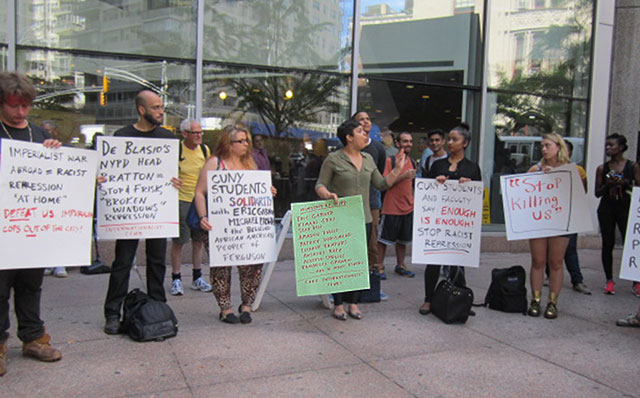
Protesters discuss cases of those killed by New York City police in recent years (listed on green poster). “Imperialist War Abroad = Racist Repression 'at Home’.” (Internationalist photo)
The rally discussed the facts behind each of the names on a poster listing some of those killed in recent years by the NYPD. When we reached the name of Sean Bell – killed by undercover police on November25, 2006 – an African American woman student spoke out:
B., Hunter student: Sean Bell got shot up on the day of his bachelor party, coming out of a strip club in Jamaica, Queens. They shot him about 30 times, 50 bullets were shot into his car.... They said he had a gun, but he didn’t. For that he got killed, a few hours before he was supposed to get married. So: for Sean Bell!
Sándor, CSEW: Michael Brown was killed in Ferguson, Missouri. We have a sign here about the Dred Scott case, which originated right there in Missouri. How many of you know about it? Yes, I’m a history teacher, but this is not a quiz. Dred Scott was a black man who was a slave in Missouri. After his owner had taken him to a free state, Dred Scott sued for his freedom in the courts. The case went all the way up to the Supreme Court, and those justices – so-called – in black robes issued a famous ruling. Chief Justice Taney said that black people “had no rights which the white man was bound to respect.” We go from the Dred Scott case shortly before the Civil War to 2014 with the killing of Michael Brown and Eric Garner, with a death sentence on the spot. First they kill them, then they try to kill their character.
Rally organizers continued going down the list of names: Patrick Dorismond, a young Haitian American man gunned down by the police here in Manhattan [on March 15, 2000]. Eleanor Bumpurs, an African American grandmother killed in her home by the police. [On October 28, 1984, police killed Bumpurs with two shotgun blasts when they went to her Bronx apartment to evict her for being four months behind on her $98.65 rent.] Anthony Baez, a young Puerto Rican man in the Bronx who committed a terrible “crime”: he was playing football in the street, and the ball accidentally bounced off a police cruiser, so a policeman got out of the cruiser and killed him with a chokehold [on December 22, 1994]. Alberta Spruill was an African American city worker who died of a heart attack when police kicked down her door and threw a flash grenade into her apartment in Harlem. They later said it was the wrong apartment. Ramarley Graham, another unarmed black 18-year-old in the Bronx gunned down by the NYPD when they barged into his home without a warrant. And how many of you remember the case of Amadou Diallo in 1999?1
A woman student responded: Well, I live up there, on Wheeler Avenue, and he just lifted up his wallet right outside his apartment and they shot him down, as many shots as it would take to kill an elephant: 41 shots. They searched his body and there wasn’t anything except his wallet. None of the officers went to jail. So then what they do is they open up a clinic named after Amadou Diallo, and where they killed him, they named that street Amadou Diallo Place. I’m really feisty, so I used to watch what the [NYPD Street Crimes Unit] – people used to call them “the goonies” back then – was doing. Luckily they didn’t catch me. They went around in black unmarked cars, with about four white police officers in the car. They wouldn’t ask you anything, just come up to you and do whatever they wanted. Up near Wheeler and Westchester Avenue in the Bronx.
Mario, Internationalist Club: A few months before the Ferguson incident, a young man was detained. His name was Victor White III. It is amazing how this young man died. He was arrested [on March 3 in Iberia Parish, Louisiana], and the police searched him but found nothing on him. They handcuffed him and put him in the back of the police car. All of a sudden this young man was dead! They said he killed himself. How in this world can a person handcuffed behind his back, who had been searched, shoot himself in the right side of his chest? His name must have been Houdini. He was 22 years old. Remember his name, Victor White III, look him up. Please read about it – this is very important, because we have to stop the police departments in this country. Enough is enough!
Morgan, CSEW: I think the way to understand what’s happening – what’s happened in the past and will continue to happen – is to understand the system we live in. We live in an upside-down system. It’s a system that set itself up violently, and we live on top of that violence. The U.S. has a “Defense” Department that is the greatest aggressive force in world history; it’s an offensive juggernaut, an imperial system, well-deployed. The “Justice” Department is based on violent repression. Michael Brown is seen as a violent individual because he’s black, but the violence is coming overwhelmingly from the “Justice” Department, and from the prison complex itself.
When protesters try to point out that this “normal” tragedy shouldn’t be normal, that it has been systematized, what happens is further violence with deployments of the military. It’s the system revealing itself. They want you to accept and submit to this kind of capital punishment, with unarmed people being murdered by police – people being called “violent,” coded as “dangerous,” and put to death.
The problem is who is in power. We need people who experience the brunt of this system to marshal the power that they do have. This is the point that was made about potential union power. When we go on strike we’re going to be shutting things down in a system that wants it to be “normal” when they kill people – and when we go on strike they will call it illegal, since we have the Taylor Law in New York State. If you’re a transit worker, or a teacher, it’s illegal to go on strike. Why is that? [Call from crowd: “They’re scared of us.”] They’re scared of that power. They say it’s essential services so how dare you shut it down – just like the bank bailout was “essential,” just like their wars are “essential services” because after all you need to “defend” capital’s expansion as it takes over resources and destroys populations.
So what we need is – what? A new system, a system where we are in power. Who is “we”? Those who are not in control of capital, those who work, who work extremely hard, or are unemployed, those who have suffered in this system, are put in prison, have been disenfranchised – that is who needs to be in charge. When they are in power, then it will be a system we can all live in, and we can respect each other for the first time in history. And that’s why we need a revolution.
M., Hunter student and PLP supporter: We were just talking about Michael Brown and Ferguson, Missouri. Whenever another racist murder happens, the media always tell you, “It’s only a few bad cops.” How is that possible? How can it always just be a few bad cops that killed Eric Garner, Kimani Gray, Shantel Davis [a 23-year-old black woman killed by Brooklyn police in June 2012], Amadou Diallo – how many bad cops are lurking around? It’s not a few bad cops that buy riot gear, that buy machine guns and armored vehicles. Every police station in this country is ready to shoot down protesters to protect profits. No one is willing to point a finger at the murderer Darren Wilson [the Ferguson cop who killed Michael Brown], but they point guns at protesters. What kind of a society is that? What we’re saying is that the police and the bosses in this country are ready for any contingency, and if they’re ready for war, then we should be at least half as organized. You have to get involved.
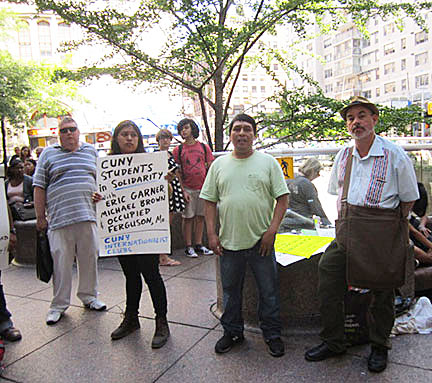
Gerónimo, worker at Liberato Restaurant and activist with the Laundry Workers Center (translated from Spanish): Good afternoon. My name is Gerónimo; I am a Mexican worker at a restaurant in the Bronx. We are here to support you and for you to support our struggle too. I have been working for about eight years in a restaurant where they were not even paying us minimum wage. We are fighting against this. We are fighting for all the workers, in any restaurant or any other kind of work. Many people work 60 hours or more without getting overtime. In my case, I work 54 hours a week but they have never paid me overtime. I also wanted to say that we support you students, we hope that you too will win in your struggles, and we thank you for your support.
His speech was greeted with enthusiastic applause. Speakers emphasized the inseparable link between the struggle for immigrant rights and the fight for black liberation. They also discussed the successful union organizing drive at the Hot and Crusty bakery near the Hunter campus, which the Internationalist Club mobilized students and adjuncts to support. The crowd chanted: “Asian, Latin, Black and White: Workers of the World, Unite!” and “Stop Racist Police Terror!”
Christina, CSEW: I’m a student here at Hunter in the Education program. Those of us who are doing student teaching working with ESL students work with children from immigrant homes or who grew up speaking a different language. One of the big issues that’s faced is police brutality in their communities. But the kind of curriculum that’s being imposed on us stands in the way of discussing the kind of issues we are talking about here today, and stands in the way of the critical thinking that we’re supposed to be encouraging. In fact, the lesson plans are being censored. Education is under attack. From pre-school all the way to graduate school, education is being more and more censored all the time. What we are doing here today – and actually thinking critically about all of this – is very important. We need to continue organizing.
Hunter student: When I was 17 I was arrested; I fell in with the wrong crowd of guys one night, and I got off with a slap on the wrist, even though I resisted arrest because they were undercover officers. The same police department gunned down an unarmed black teenager named Denzel Curnell; that was earlier this year [in Charleston, South Carolina].2 The same police department that laughed and said “boys will be boys,” because I’m white, and it was in the South, later gunned down a boy who was about the same age as myself. Why does “boys will be boys” only apply to white boys such as myself, and how long does police violence have to go on until things change?
Gordon, CUNY Graduate Center student: Hello, everyone – I’ll just tell you a little anecdote about my life. My parents are from Jamaica; my father is Afro-Jamaican, my mother is mixed. As I was growing up here in the U.S., my father would always tell me that every time I interacted with the police I would have to be respectful, do what they say, really toe the line, because otherwise I would run the risk of suffering severe bodily harm. I don’t imagine that many white folks – and I grew up in a mostly white neighborhood – got that kind of talk from their parents.
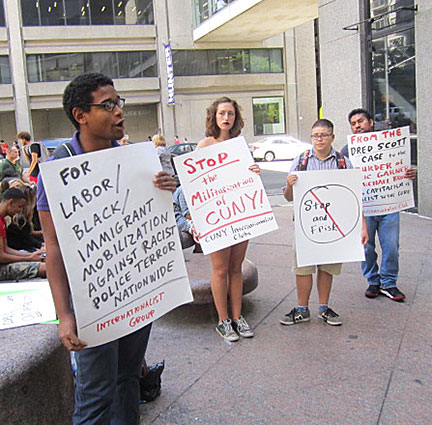
So if we fast-forward a few years, I was living in Philadelphia. Similarly to something mentioned earlier today, there was a police unit which came to my apartment at 4 in the morning; they didn’t use a flash-bang grenade, thankfully, but they broke down the door. They didn’t have a warrant. They put me under arrest, and I was handcuffed. I asked what I was under arrest for and they said I “knew” what I did. They showed me a picture of a black man – clearly not me, with a different complexion, he was older, he was bald, he had a different weight. They looked at his picture, they looked at me, then they uncuffed me and said “Well, it’s all the same to us.” And then they left.
A year before that I was also arrested, for what one of my
friends called “being black in public.” This was also in
Philadelphia. I was just walking to meet a friend from work,
and I saw, incidentally, a black man being brutalized by the
police. So I stopped and I was watching it. They were accusing
him of resisting arrest. From my perception he was not
resisting arrest: the arresting officer was a white man, he
had called him a “nigger.” The fellow that was being placed
under arrest said, “OK, I don’t want to be arrested by you,
have someone else arrest me.” Then they tased him three times,
and he was charged with “terroristic threats,” which
in Pennsylvania means up to three years in prison,
because he supposedly threatened to fight the police officer.
A 16-year-old girl filmed the tasing and was punched in
the face and her phone destroyed (smashed on the ground). I
and the arrested man’s brother were arrested for supposedly
“inserting ourselves” into a police investigation. The judge
pressured us to plead guilty or no contest, but we pleaded not
guilty. When the trial date came around we were told the
charges had been dropped for lack of evidence. We both
testified for the arrested man, and he got off, thankfully,
because it was a bogus charge. He was lucky that he survived
being tased three times in the space of about two minutes.
To sum up: police brutality, particularly against blacks and Latinos, is not something that’s unique to New York or is an anomaly in Ferguson. It is something that is part and parcel to the social system which we currently inhabit. So – it needs to go.
Will, Hunter student: I haven’t experienced police brutality against myself, but I can say something about the capitalist system that we live in. I’m sick and tired of living in a society where I have to go into debt in order to get an education. And then lots of us will be forced to do something we don’t like as a job, in order to get out of debt. We’re being forced by these corporations, and have to continue paying them our wages – and student debt is the only kind of debt that you can’t get out of, ever. If you declare bankruptcy, you still have to pay your student debt back. If you die, it goes to your spouse or your children. It’s not right.
We need to make huge changes in this capitalist society in order to get ourselves free. The police brutality that happens against people of color is this country is the same kind of brutality that this country is perpetrating on other people of color overseas. It’s just oppression so that the people in power can make more money. It’s the same kind of oppression that’s been going on since the founding [of the U.S.]. First it was slavery, then slavery was overthrown and it became Jim Crow; that that was overturned and now it’s just locking people up or killing people on the street. Things are not changing, and they won’t change unless people stand up and have their voices heard.
Sándor, CSEW: Amadou Diallo became a symbol of the system of racist police terror. So perhaps after you’re murdered you have a street named after you, like Amadou Diallo Place. They even put Malcolm X on a postage stamp decades after he was killed. Decades after they went after Paul Robeson, they put him on a postage stamp, too, and a high school was named after him (which was shut down in the recent wave of racist school closings). In his book State and Revolution, V.I. Lenin – together with Leon Trotsky, he was the leader of the Russian Revolution – said that when revolutionaries are alive, the ruling class demonizes them and says you should hate and despite them. But after they’re dead, you can make them into a safe icon.3
On August 23 a march for Eric Garner’s family was held in Staten Island, which we went to. The United Federation of Teachers did a good thing – union leaderships often don’t do what they should, but in this case they supported that march to stand in solidarity with the family of Eric Garner. The faculty/staff union from CUNY also marched. And then the Patrolmen’s Benevolent Association launched a campaign against the teachers union, saying how dare they take an “anti-police” stand by marching that day.
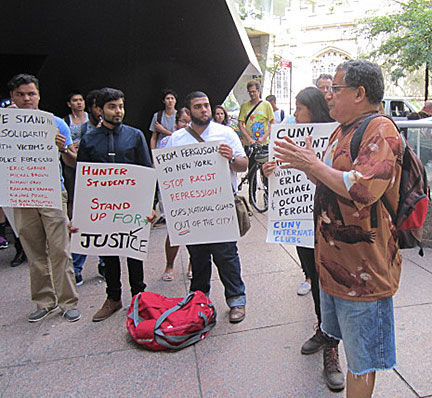
What a lot of teachers say is: How could we not stand with our students? Who is being targeted by stop-and-frisk? At CUNY too – you can see it at the subway exit at Hostos Community College in the South Bronx, and lots of other places. For unions to take a stand against racist police brutality is an important beginning, but it’s only a beginning. How many petitions have there been about these issues – and what have they accomplished? Nothing! What were you told when Obama was running for election? “Yes We Can – Hope and Change.” To have an African American president was a social change in a society founded on slavery – but did it bring a political change? [Voices from the crowd: “Not at all!”] The deporter-in-chief is President Barack Obama of the Democratic Party. He has escalated deportations to 400,000 a year, a new record.
Every time you turn on the television there’s a new war. The U.S. has been at war virtually all the time through the lives of most of the people I see here. The governor of Missouri who sent in the National Guard is a Democrat too. And it’s Obama’s Department of “Defense” that’s given all that military equipment to the police. But what if the unions didn’t just go to a march but actually used their power against racist terror? For example, the people who drive the subway right here and the buses – their sons and daughters are being slammed up against the wall, locked up, locked down and targeted by the police under Mayor de Blasio and his appointee Bill Bratton today. As we have said time and again, the next time the NYPD carries out one of these racist murders, the transit workers and other unions should shut the city down. Wall Street can’t get its workers if there’s no subway. We’re talking about the power of the working class. We won’t get anywhere with illusions in the Democratic or Republican parties – only by exercising that power.
Where “race” and racism and racial oppression come from is the capitalist system. This isn’t just “a theory” (we’re told evolution is “just a theory” too) – it’s what you find out when you look at history.
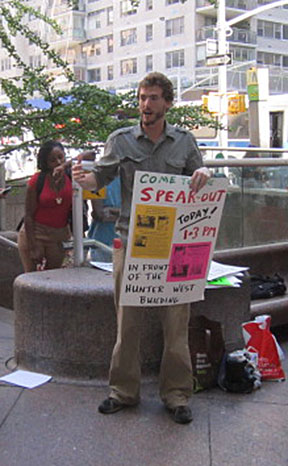
Hunter student: I’m studying a lot about poverty right now. I read statistics from a study that showed that people living in Harlem had a shorter life expectancy than people living in Bangladesh.4 How is this possible in one of the richest countries in the world? How is it possible that the lowest 60% of the U.S. population has just [2.3%] of the wealth? How is it possible that we can’t feed our kids nutritious meals? Because bad food is cheaper. How is it possible that we’re living in a city that is so divided, where people are sleeping on the ground because they can’t find anywhere to live, while people are living in $4,000 apartments on the park?
I would also like to make a comment about the Michael Brown shooting and the killing of so many young black men. It is a crisis for our generation, whether you’re white, black, Latina, anything – you should be concerned about this attack on people of our age group. You can pretend that you’re ignorant, that you don’t want to look up anything about it or get involved, that it’s “too political” – but it’s a crisis. When someone your age has a likelihood of being shot down for no reason, you should be afraid and you should be angry, and we should all be angry.
Hunter student: It’s called police brutality, but what it really is, is a war being waged against people of the cities by the police. That warfare is waged not only through physical violence but economic violence, like gentrification, running people out of their homes, out of their neighborhoods. It’s a systematic approach of oppression. And that war won’t end until people do something about it.
Hunter student: It’s no coincidence that at the same time the military or National Guard were called in to occupy Ferguson, the occupation of Gaza turned extremely violent. Because working people have to be walled off by the state, and when those walls don’t work effectively the state will use violence with no conscience to keep those working people down. And you can see that clearly when the military National Guard was called into Ferguson to restore “order” and when the IDF [Israeli Defense Forces] were sent into Gaza to bomb indiscriminately and kill Palestinians. The state will always use violence to defend profit, from this part of the world all the way to other parts of the world. The struggles of minorities in this country are intimately linked to Palestinian struggle and to struggles all across the world for people who are oppressed.
Amy, Hunter College: As a Hispanic woman, I’ve been living in the Bronx the majority of my life. I’m 20 years old and a Sociology major. I want to say that all too many of us are more comfortable leading our own individual lives than caring about what is going on. Yet we are witnessing systematic violence against the very people who have been here since slavery. And then there is the social question of how people treat each other and are divided up, like on social media: light-skinned against dark, I have money and you don’t – these are all derived from capitalist ideas. You are idolizing the very thing that’s oppressing you!
So they want it to be Hispanic versus black, one skin color against another. The people who have been the most oppressed historically are the minorities, and need to be one of the main voices speaking out against this. We’re here now in student debt like my fellow student said today; in poverty. I had to work over 40 hours a week while maintaining my GPA, and I’m still waiting for my overtime pay from my job. Don’t let your mind get murdered, ’cause that’s how the capitalist system works in intricate, quiet ways.
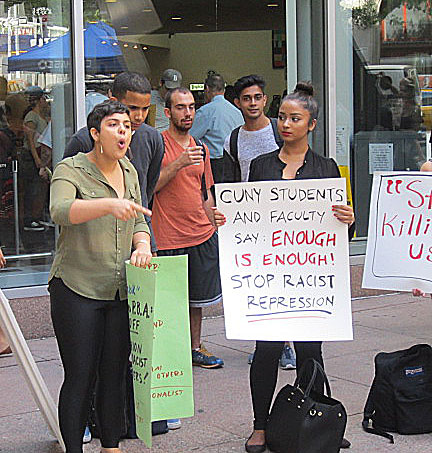
Rally organizer: How do you get more people to come out to protests and to speak out? By organizing. And it’s not always easy. Who spends their time organizing against racist police terror, or against the oppression of women, or against wage theft and other things discussed here today? The type of people that do that are usually radicals. Being radical means getting to the root of things. It means digging under the surface. And that’s what we have to do if we want to get to the bottom of racist police brutality. We’ve been talking about the idea that racial oppression and police violence are related to capitalism. So we’d like people to think about that, and to think about connections between racist repression here and imperialist war abroad, between racial oppression and the oppression of women, what we mean by class struggle and socialist revolution.
[There was discussion about the struggle against the militarization of CUNY, the Board of Trustees’ appointment of David Petraeus, how ROTC and military recruiters target poor and working-class students to be cannon fodder to kill and be killed for imperialist war.]
B., Hunter student: That’s how they got me – ROTC. I bumped into a recruiter outside of my house, a mile away from my school. He was doing all this convincing, to get me straight from high school. And I actually did it, but thank God I got out of it, because honestly I don’t think you should be fighting for something when you don’t understand what it’s about. When I signed up, it was right around the time the war started. We were being sent to Iraq. I found out that 250 people from my unit ended up passing away. I feel like you should be informed, rather than letting these people brainwash you with all these promises that aren’t really going to happen. We could make a difference if we stand together and fight together.
E., Hunter student: I’ve done some writing about racial oppression, and some studying on racial stereotypes. People may have seen material about the “doll tests” [on concepts about skin color among young children]. Anderson Cooper went into schools and asked a series of questions to children from very diverse backgrounds – black, white, Asian, Latino – about a white doll and a black doll. They’d ask which is the pretty doll, and which doll is the nice doll, and many children, whether white or people of color, would choose the white doll; they’d ask which is the ugly doll or the bad doll and they’d choose the black doll. So even within children, stereotypes get developed at a very young age... You can trace some of it back to Linnaeus5, who labeled different “races” as “subspecies,” Homo Europaeus, Homo Asiaticus, Homo Africanus, etc. A lot of these kinds of ideas continue to exist even though it has all been proven to be wrong.
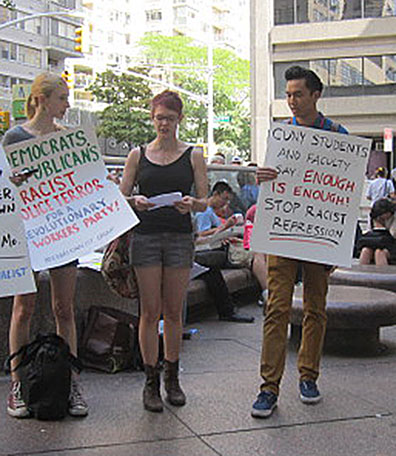
Allison, Internationalist Clubs: What I wanted to talk about is that this isn’t just some issue of police “reform.” We don't need “nicer” police, we don’t need “better training” for police. The police are trained. And we’re not only talking about situations like Ferguson and the situation with the killing of Eric Garner. We’re not talking about a few renegade cops being “more aggressive than necessary.” We’re talking about police officials traveling to Israel to learn occupation tactics. We’re talking about police being supplied with military equipment and armored cars, even in places in rural Maine.
And that brings up another point: that this isn’t just about “excessive militarization” of the police force. This is the nature of the police, the armed force of the state. And we don’t need to make sure that the police “Serve and Protect,” because they already do. The police do not serve and protect “the people,” not black, Latino, immigrant workers. The police serve and protect exactly what they were created to serve and protect: the capitalist system. And capitalism thrives on racism. Just as the U.S. imperialist operations in other countries serve the interests of capital abroad, the police serve to repress the people within this country who pose a threat to the existence and stability of capitalism.
But I also wanted to say that this system is not eternal. It’s actually very sick, and we need to do more than try to patch it up and treat the symptoms. We need to put forward a revolutionary program that can challenge and overthrow the existing system itself, because that is when we will begin to see the end of tragedies like this, and the end of racism.
A rally organizer spoke about how the origins of the police in the United States lie in the “slave patrols,” established by the slave owners to hunt down and capture runaway slaves. On the basis of these patrols, Charleston, South Carolina created a uniformed, armed paramilitary force in 1783 to control the city’s large slave population, with other Southern cities following suit. It was half a century before Boston established the first Northern paid police force, followed by New York City.
The speaker also pointed out that the system of armories, like the one on 67th Street across from Hunter College, was set up in the wake of the Great Labor Uprising” of 1877. In St. Louis, Missouri, one of the hubs of that mass labor revolt, black and white workers united in militant struggle that led the capitalist class to build up its repressive forces against the threat of social revolution. This is vividly depicted in the documentary “1877: The Grand Army of Starvation,” produced by CUNY’s American Social History Project and narrated by James Earl Jones (see http://ashp.cuny.edu/ashp-documentaries/eighteen-seventy-seven/).
After the rally, many students stayed to discuss the issues raised and plans for further organizing. ■
- 1. For more information on these cases, see Internationalist articles: “Racist NYC Cop Terror Sets Off Angry Protests,” The Internationalist No. 1 (January-February 1997); “Amadou Diallo Murdered by NYPD Death Squad,” The Internationalist No. 7 (April-May 1999; “Alberta Spruill: Victim of NYPD Killer Elite,” The Internationalist No. 16 (May-June 2003); “50 Bullets: Racist NYPD Execution, Again,” The Internationalist No. 25 (January-February 2007); “Thousands Protest Racist NYPD ‘Stop and Frisk’,” The Internationalist special issue (Summer 2012); “East Flatbush Police State: Racist NYPD Kills Again,” The Internationalist No. 34(March-April 2013); “Racist NYPD Murder of Eric Garner” (July 2014).
- 2. See http://www.charlestoncitypaper.com/charleston/gaps-remain-in-the-denzel-curnell-suicide-narrative/Content?oid=4957874 and http://www.charlestoncitypaper.com/TheBattery/archives/2014/06/24/police-denzel-curnell-was-armed-officer-did-not-fire-shot
- 3. Writing about attempts by reformist “socialists” to water down and distort the ideas of Karl Marx in order to justify alliances with their “own” capitalist rulers, Lenin wrote that “in the course of history, [this] has happened repeatedly to the theories of revolutionary thinkers and leaders of oppressed classes fighting for emancipation. During the lifetime of great revolutionaries, the oppressing classes constantly hounded them, received their theories with the most savage malice, the most furious hatred and the most unscrupulous campaigns of lies and slander. After their death, attempts are made to convert them into harmless icons, to canonize them, so to say, and to hallow their names to a certain extent for the ‘consolation’ of the oppressed classes and with the object of duping the latter, while at the same time robbing the revolutionary theory of its substance, blunting its revolutionary edge and vulgarizing it.” As part of the preparation of the 1917 Bolshevik Revolution, Lenin wrote State and Revolution to educate workers and youth in the Marxist understanding that “special bodies of armed men” such as the police and armed forces are the core of the capitalist state; that the purpose and function of this armed fist of the ruling class is to subjugate the workers and oppressed; and that the bourgeois state cannot be reformed or “taken over” – it must be smashed and replaced with a workers state.
- 4. See http://lifeabundantly-alim.blogspot.com/2010/09/people-die-younger-in-harlem-than-in.html; http://articles.latimes.com/1990-01-18/news/mn-336_1_death-rate; http://tcf.org/blog/detail/a-tale-of-two-recoveries; and http://www.politifact.com/wisconsin/statements/2011/mar/10/michael-moore/michael-moore-says-400-americans-have-more-wealth-/
- 5. See http://serendip.brynmawr.edu/exchange/node/1852 and http://www.understandingrace.org/history/science/early_class.html

